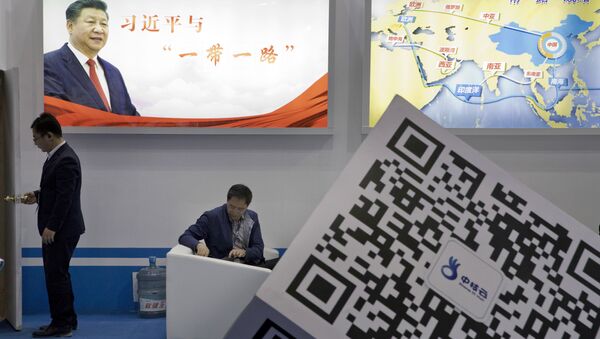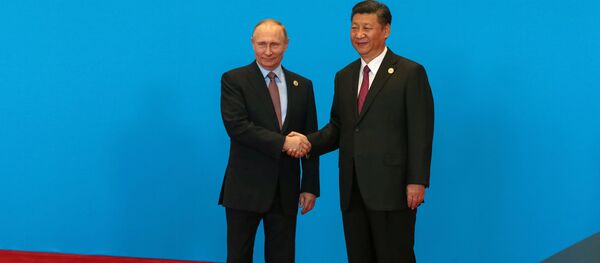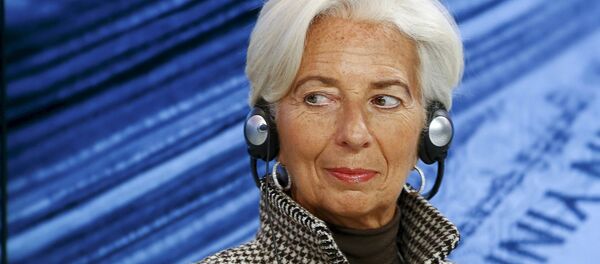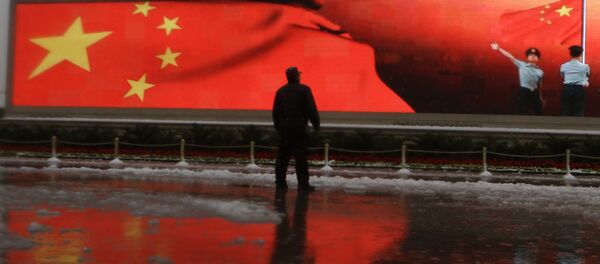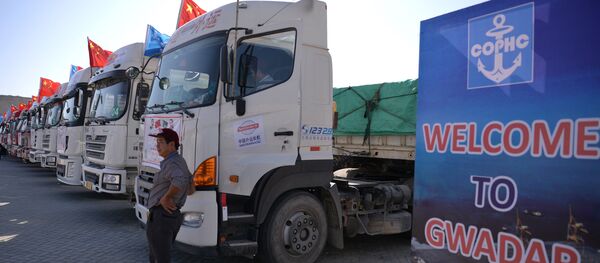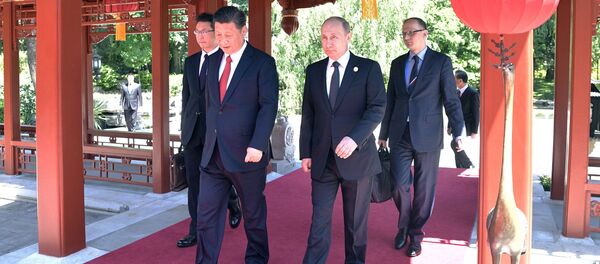MOSCOW (Sputnik), Tommy Yang — Both Chinese president Xi Jinping and premier Li Keqiang met with Pakistani Prime Minister Nawaz Sharif ahead of the two-day Belt and Road Forum for International Cooperation in Beijing that concluded Monday, inking an additional six agreements worth nearly $500 million aside from the $46 billion China has already pledged to projects under the CPEC.
Despite India's strong protests over the CPEC for violating its sovereignty over Kashmir and its decision to skip the Silk Road summit in Beijing, Chinese leaders looked to be keen on investing heavily in the CPEC and building a strong relationship with India's neighbor and regional rival Pakistan.
Pakistan's Gwadar port features prominently in the CPEC plan and is considered to be a crucial link between China's One Belt, One Road and Maritime Silk Road projects. The $50-billion CPEC project has been viewed with concern by India as it runs through the disputed region of Kashmir.
Stable Pakistan Means Less Terror Threats in China
Chinese authorities have blamed Uighur separatists from the East Turkestan Islamic Movement for launching a series of bloody terrorist attacks in China in recent years, including an attack in the Tiananmen Square in the heart of Beijing in 2013 that left five people dead. But overseas Uighur rights groups, including the World Uighur Congress, said the attacks were results of the Chinese Communist Party’s repression against the minority group, who are being treated as second-class citizens as more and more Han Chinese are moving into the Xinjiang province and taking employment opportunities away from locals.
To address the security threats, Chinese authorities stepped up their efforts in combating jihadism in the region while working to improve economic conditions in the restive province, especially in the southern part of Xinjiang where it borders Pakistan and Afghanistan. With the rise of the Islamic State (IS, outlawed in Russia) terrorist group, Chinese authorities said many Uighur militants left China through the border with Pakistan and Afghanistan to receive training from overseas jihadist groups and launch attacks in China upon their return.
By improving economic conditions and bringing more job opportunities to Pakistan through projects under the CPEC, China can also ease security concerns within its borders, experts said.
“The CPEC can help ease China’s concerns of extremism in Xinjiang. Once Pakistan becomes stabilized and has a vibrant economy, there will be more jobs for local young men, including those who came across the border from China,” Kanti Prasad Bajpai, a professor on Asian Studies at Lee Kuan Yew School of Public Policy in Singapore, said.
The CPEC includes projects that will build roads and railways connecting Kashgar, an important city in southern Xinjiang, with Gwadar, a deep water port on the Arabian Sea in Pakistan. This massive transportation network is expected to help improve the underdeveloped economy in southern Xinjiang.
“Once the logistic channels are built [between Kashgar and Gwadar], products can be moved back and forth. It will definitely help improve income levels in southern Xinjiang and boost local economic growth,” Wei Houkai, the director of the Research Center for the Development of Western Regions at the Chinese Academy of Social Sciences, said.
A New Route for China's Crude Oil Import
China surpassed the United States as the world’s largest energy consumer in 2010, according to data from the International Energy Agency. Official figures showed that while coal consumption continued to dominate China’s overall energy consumption at 62 percent in 2016, the nation’s oil consumption grew by 5.5 percent in 2016, while coal consumption dropped by 4.7 percent.
With limited domestic oil production capacity, China’s crude oil imports continued to roar in recent years. About 64.4 percent of China’s oil consumption came from imports in 2016, the China National Petroleum Corporation Economics and Technology Research Institute said in a report earlier this year.
The nation’s crude oil imports surged to the all-time high in March to nearly 9.2 million barrels per day, official data from Chinese customs showed. China’s crude oil import levels in the first quarter of 2017 were above those of the United States, making China the world’s top crude oil importer of this year, according to data from the US Energy Information Administration.
The Malacca Strait, which may be considered as China's energy lifeline, could paralyze the Chinese economy in case of unforeseen circumstances such as a war in the region, Xia Yunjiao, a professor from the China University of Geosciences in Wuhan warned in a research report on the CPEC projects.
Access to the Arabian Sea through the Gwadar port in Pakistan offers an alternative route for China’s crude oil imports, offering Beijing energy security in case of instabilities in the Strait of Malacca, Chinese experts suggested.
In a detailed CPEC long term plan leaked by Pakistan’s prominent newspaper Dawn, some Chinese enterprises have started investment and construction in Gwadar taking advantage of its superior geographical position and cheap shipping costs to import crude oil from the Middle East, iron ore and coking coal resources from South Africa and New Zealand.
But other Chinese scholars also warned that it’s not necessary to exaggerate the advantage of the trade route through Pakistan over the Strait of Malacca.
“After the crude oil and other products are transported to Kashgar in Xinjiang, how will they be moved to eastern and southern Chinese cities such as Guangzhou, where they’re needed most? The products still have to travel over 4000 kilometers on the road through China," Yang Shu, the director of the Institute for Central Asian Studies at Lanzhou University in China, said.
It would still be cheaper to ship products to Guangzhou by ship through the Strait of Malacca, he added.
